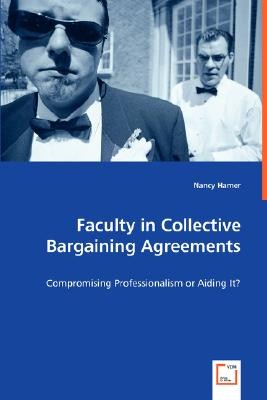
- We will send in 10–14 business days.
- Author: Nancy Hamer
- Publisher: VDM Verlag Dr. Mueller E.K.
- Year: 2008
- Pages: 144
- ISBN-10: 3639012445
- ISBN-13: 9783639012446
- Format: 15.2 x 22.9 x 0.8 cm, softcover
- Language: English
- SAVE -10% with code: EXTRA
Faculty in Collective Bargaining Agreements - Compromising Professionalism or Aiding It? (e-book) (used book) | bookbook.eu
Reviews
Description
The inclusion of professionals in a unionized workforce, particularly in higher education has not been one of unquestioned acceptance. A key concern is that faculty are members of a learned profession that not only has enjoyed, but may require, working conditions that are antithetical to the industrial labor environment of a unionized workforce. While faculty members in the United States have engaged in healthy debates over working under collective bargain agreements, there remains little study of how the profession currently fares in these agreements. To address this gap, this study is an examination of the relationship between the professional concerns of faculty and collective bargaining. It centers on whether unionization is fundamentally compatible with the definition of a professional, as perceived by the faculty surveyed, and if their collective bargaining agreements act as agents of hindrance, or facilitation, with regard to faculty professional concerns. Information gained from this study may inform the collective bargaining process for both sides of the table, and lend an understanding of the impact of these agreements upon faculty professional concerns.
EXTRA 10 % discount with code: EXTRA
The promotion ends in 19d.13:23:58
The discount code is valid when purchasing from 10 €. Discounts do not stack.
- Author: Nancy Hamer
- Publisher: VDM Verlag Dr. Mueller E.K.
- Year: 2008
- Pages: 144
- ISBN-10: 3639012445
- ISBN-13: 9783639012446
- Format: 15.2 x 22.9 x 0.8 cm, softcover
- Language: English English
The inclusion of professionals in a unionized workforce, particularly in higher education has not been one of unquestioned acceptance. A key concern is that faculty are members of a learned profession that not only has enjoyed, but may require, working conditions that are antithetical to the industrial labor environment of a unionized workforce. While faculty members in the United States have engaged in healthy debates over working under collective bargain agreements, there remains little study of how the profession currently fares in these agreements. To address this gap, this study is an examination of the relationship between the professional concerns of faculty and collective bargaining. It centers on whether unionization is fundamentally compatible with the definition of a professional, as perceived by the faculty surveyed, and if their collective bargaining agreements act as agents of hindrance, or facilitation, with regard to faculty professional concerns. Information gained from this study may inform the collective bargaining process for both sides of the table, and lend an understanding of the impact of these agreements upon faculty professional concerns.


Reviews